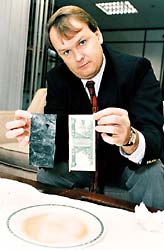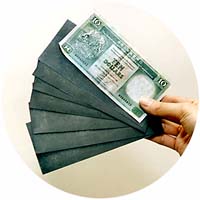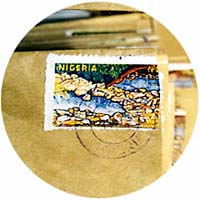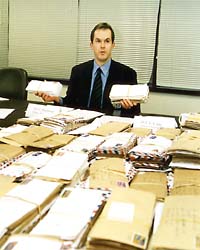



















|
| |
 CCB's SIP Dave Cope demonstrating the "Black Money" scam: "Victims are left with a suitcase of worthless paper" |
You have just received a poorly written, misspelled and semi-coherent URGENT business proposal
from out of the blue in the form of a junk letter from a self-proclaimed "reliable person" in Nigeria. Its
unofficial-looking official letterhead is a hastily-drawn logo representing a Nigerian governmental
department seal.
The letter basically says: "Dear Sir/Madam, You don't know me, but I am a conman. I have stolen lots of money, can you help me launder it? If you do you will get a big cut of the funds which are worth millions. Please send me your name, address, phone number and personal bank account number. I will be in contact with you. P.S.: Please keep the contents of this photocopied letter that has obviously been sent out in search of thousands of other greedy fools private and confidential." WOULD you respond to it? According to Chief Inspector Matthew Hemmings of the Hong Kong Police Force's Commercial Crime Bureau, a surprising number of people in Hong Kong do respond - and get burned the process. |
|
"A total of 42 victims with losses amounting to US$1.7 million have reported to the Commercial Crime Bureau in the last three years," said CIP Hemmings. "Their actual numbers might be even larger because these type of cases involve money laundering and victims are too embarrassed to report to the police." To date, the CCB has handled fraud cases such as these on a worldwide basis involving a total sum of US$70 million. Recently there has been a surge in the number of cases commonly referred to as "Nigerian fraud letters". "There are a large number of criminal syndicates that operate out of Lagos, Nigeria," said Mr Hemmings following a Commercial Crime Bureau investigation that resulted in the seizure last week of 11,460 Nigerian advanced fee fraud letters mailed via the Hong Kong Post Office, which represented 95 per cent of the incoming mail from Nigeria. After consultation with the Department of Justice, the letters were seized by CCB (with the co-operation of Post Office staff) under Section 23(4) of the Post Office Ordinance. "These syndicates send out 'cold-call mail shots' from Nigeria to business addresses worldwide, including Hong Kong, in search of potential victims. The addresses are sourced from local and international telephone directories and various business publications," continued Mr Hemmings. | |
|
Receivers of the letters are asked to assist in the transfer of funds out of Nigeria with a view of laundering those funds claimed to be obtained from dubious sources in the country - usually a fallen dictator's ill-gained fortune, but also less dubious sources such as inheritance funds. Recipients are usually promised as a reward for their co-operation a 30 to 40 per cent cut of the cash which of course does not really exist. The fraudster's aim is to make whatever money he can from any person who replies by inducing that person to pay various advance fees along the way to secure the release of the funds. "People who answer such letters (that come through the mail or via fax) and provide their bank account details often find that their account data is used in attempts at fake remittance requests," said the Bureau's Senior Inspector Dave Cope. |  One in a million. The rest is worthless black paper. |
|
"The letters are a considerable source of embarrassment for the Nigerian government, as most wrongly suggest that the sender is a government official who has come upon a large sum of money, normally in the tens of millions of US dollars," said CIP Hemmings. "After receiving complaints, CCB informs the Nigerian Consulate in Hong Kong, who have been very helpful and co-operative on the cases." In addition officers from the Commercial Crime Bureau have been in contact with officials from the Nigerian Post Office to devise a long-term strategy to prevent the further entry of fraudulent letters into Hong Kong. Because syndicate members also often pose as top-level Nigerian bank officers, that country's Central Bank has taken the step of arranging publication of not a few one-page advertisements in the international press warning of such scams. Even so, people continue to fall prey to the syndicates. CCB officials know that these syndicates operate in Hong Kong, but cannot say they are based here. What's for certain is that the many scams and tactics of these conmen have over the years become much more sophisticated - the latest, persuading victims that blackened money can be changed into its original state by using special chemicals, for which the victim must pay a hefty sum of money. | |
 |
Even if a person has been silly (or greedy) enough to have responded to an advanced fee fraud letter and paid all the up front fees required by the syndicates to transfer the money claimed to be out of Nigeria, the dupe will often find that the money they have been asked to receive has been converted into a "security blackened" form. "This is known as the 'Black Money Scam'," explained CIP Hemmings. "Apart from one bank note which is authentic and used to demonstrate the chemical cleansing process, the rest of the cash is just blackened paper cut into the shape and size of dollar bills. Victims, who are required to pay further advance fees for the chemicals which return the money to its normal state, are left with a suitcase full of worthless black paper." |
|
One victim in Hong Kong reportedly paid over US$1 million for just such a suitcase of black paper. Predominantly these "Black Money" conmen are from Nigeria, but are also from other West African countries such as Cameroon and the Ivory Coast. They come to Hong Kong as visitors and meet their victims in hotel rooms. Some recently met in a Hong Kong hotel with CCB's Detective CIP Peter Barnes who posed as an Australian businessman eager to purchase the chemical solution that would turn a suitcase of useless blackened paper into the real thing. Arrests were made. Indeed, arrests of West African syndicate members made in connection with a variety of frauds committed in Hong Kong include 21 in 1996, two dozen last year, and nine so far in 1998. Police now urge any person who has been a victim of such fraud, or who has received a fraud letter from Nigeria or elsewhere to contact the Commercial Crime Bureau on 2860-5013. |  CIP Matthew Hemmings: "CCB's investigation resulted in the seizure of 13,530 Nigerian advanced fee fraud letters mailed via the Hong Kong Post Office, which presented 95 per cent of the incoming mail from Nigeria - and that was in just over a month" |

